As a home cook, I know how frustrating it can be to find a recipe that calls for an ingredient you don’t have on hand.
Spring onions are a common ingredient in many dishes, but what do you do if you don’t have any? Luckily, there are several substitutes for spring onions that can be used in a pinch.
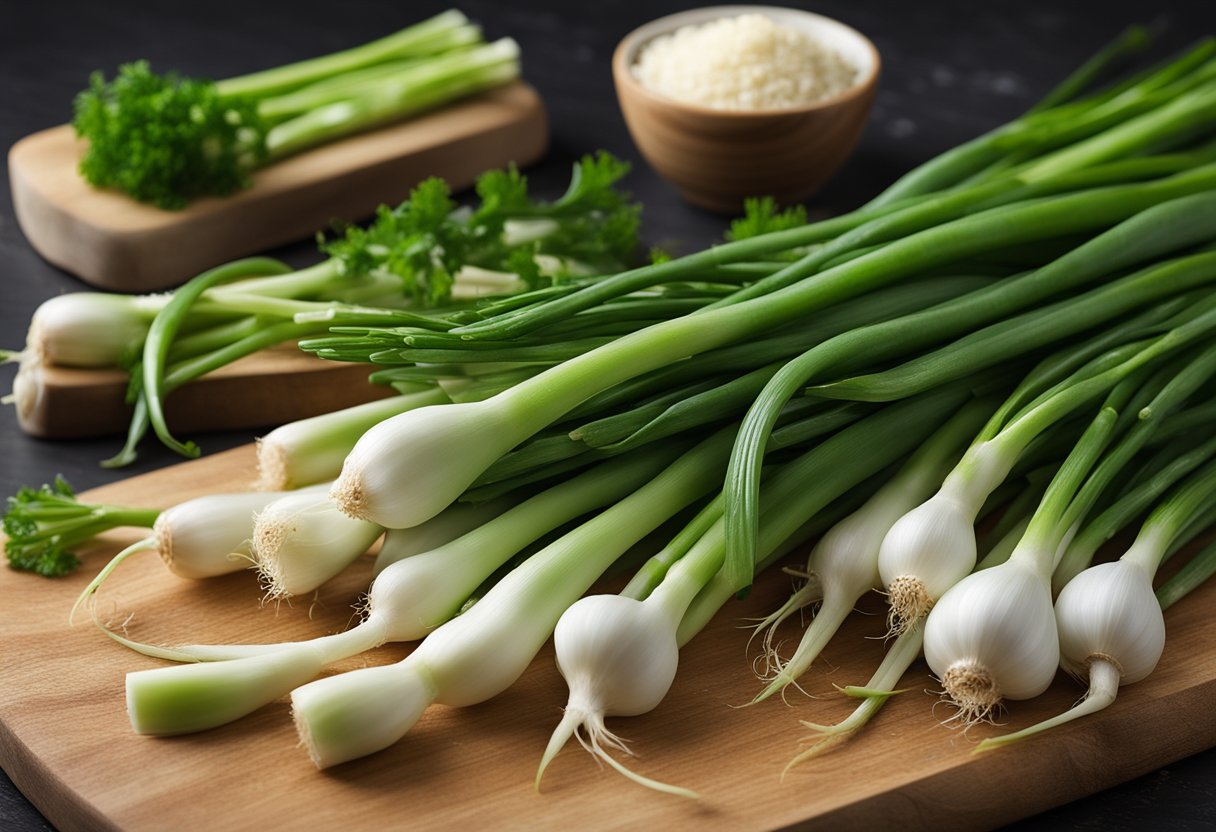
Understanding Spring Onions Spring onions are a type of onion that are harvested before they fully mature. They have a mild flavor and are often used in salads, soups, and stir-fries.
Spring onions can be eaten raw or cooked, and both the white and green parts are edible.
Key Takeaways
- Spring onions are a mild-flavored onion harvested before they fully mature.
- Spring onions can be eaten raw or cooked, and both the white and green parts are edible.
- There are several substitutes for spring onions that can be used in a pinch.
Understanding Spring Onions
Spring onions, also known as scallions, are a type of onion that belongs to the Allium family. They are harvested when they are young and have a mild flavor compared to mature onions.
Spring onions can be used in a variety of dishes, both cooked and raw, and are a popular ingredient in Asian cuisine.
The spring onion has two parts: the green part and the white part. The green part is the leafy stalk, while the white part is the bulb.
Both parts of the spring onion are edible and can be used in cooking. The green part has a milder flavor compared to the white part, which has a more pungent taste.
When harvesting spring onions, it is important to cut them at the base of the plant, leaving the roots intact. This allows the plant to regrow and produce more onions. Spring onions have a relatively short shelf life and should be used within a few days of harvest.
To store spring onions, wrap them in a damp paper towel and place them in a plastic bag in the refrigerator. This will help keep them fresh for a longer period of time.
In summary, spring onions are a versatile ingredient that can be used in a variety of dishes. They are harvested when young and have a mild flavor compared to mature onions.
The green part and white part are both edible and should be cut at the base of the plant when harvesting. To store spring onions, wrap them in a damp paper towel and place them in a plastic bag in the refrigerator.
Nutritional Value of Spring Onions
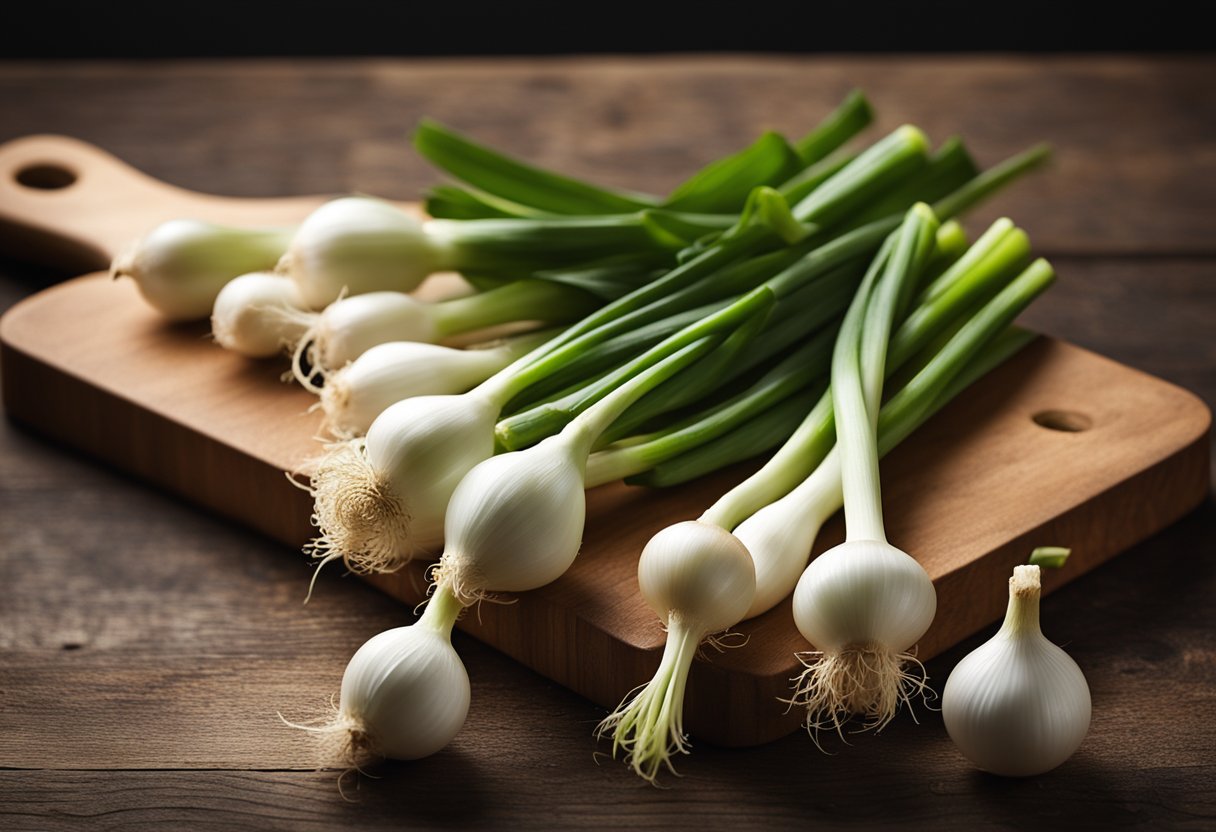
As a cooking ingredient, Spring Onions are a versatile vegetable that can add flavor and texture to a variety of dishes. However, they also have a range of nutritional benefits that make them a healthy addition to any meal.
Spring onions are a good source of Vitamin K, which plays a crucial role in blood clotting and bone health. Just one cup of chopped spring onions provides over 200% of the recommended daily intake of Vitamin K.
Additionally, spring onions are an excellent source of Vitamin C, which is essential for maintaining a healthy immune system. One cup of chopped spring onions provides over 100% of the recommended daily intake of Vitamin C.
Spring onions are also a good source of folate, which is important for cell growth and development. Folate is especially important for pregnant women, as it can help prevent birth defects.
One cup of chopped spring onions provides approximately 20% of the recommended daily intake of folate.
In addition to their nutritional value, spring onions also have a range of health benefits. They contain antioxidants, which can help protect against cancer and other diseases.
They also have anti-inflammatory properties, which can help reduce the risk of heart disease and other chronic conditions.
Overall, spring onions are a nutrient-dense vegetable that can provide a range of health benefits. Whether you’re looking to add flavor to your favorite dish or boost your overall nutrition, spring onions are a great choice.
Common Uses of Spring Onions
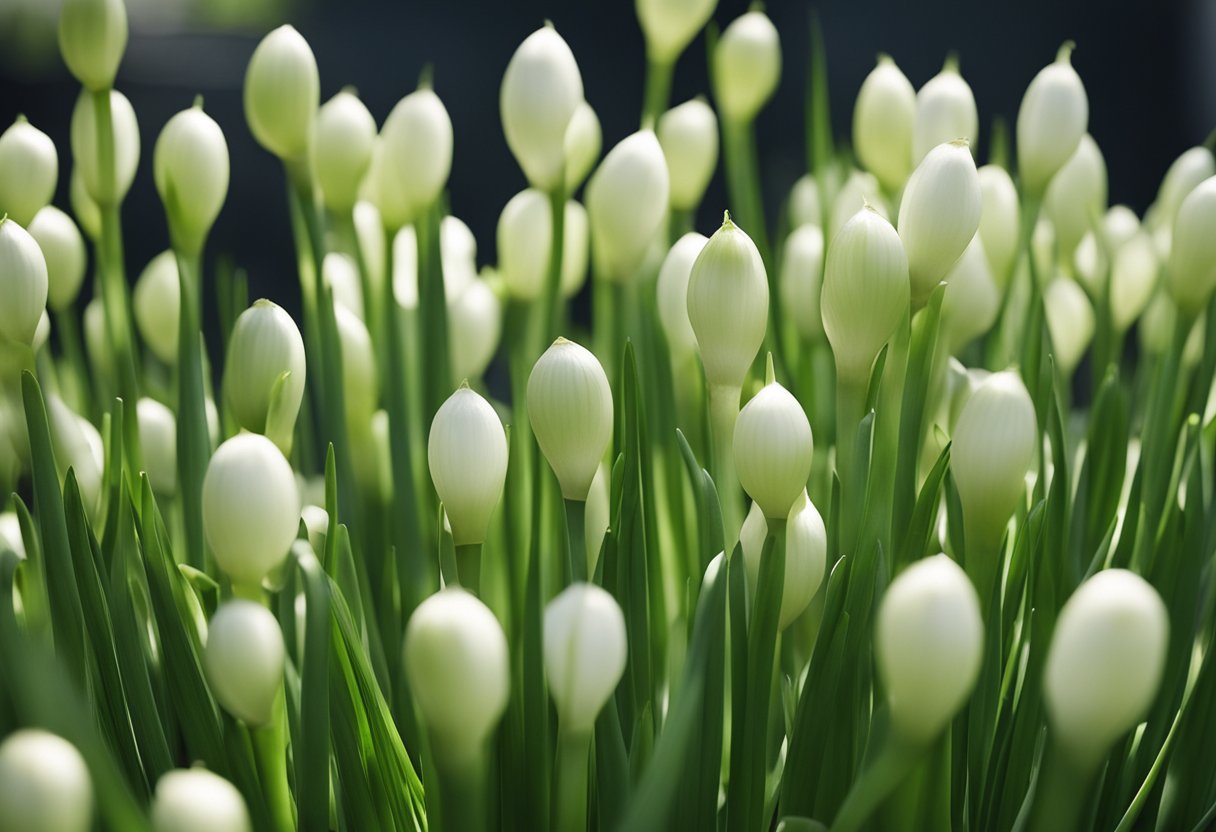
As a versatile vegetable, spring onions are used in many different types of dishes. They can be eaten raw or cooked, and they add a unique flavor and texture to meals.
Here are some common uses of spring onions:
Salads
Spring onions are often used as a garnish for salads. They add a fresh, crisp flavor that complements the other ingredients. They can also be chopped up and mixed in with the rest of the salad for a more intense flavor.
Soups and Stews
Spring onions are commonly used in soups and stews. They add a savory flavor that pairs well with the other ingredients. They can be added at the beginning of the cooking process or as a finishing touch.
Asian Cuisine
Spring onions are a staple in many Asian cuisines, such as Chinese, Japanese, and Korean. They are often used in dishes like stir-fries, dumplings, and noodle soups. In Korean cuisine, they are a key ingredient in pajeon, a savory pancake that is often served as a snack or appetizer.
Recipes
Spring onions can be used in a wide variety of recipes. They can be used as a topping for pizza or mixed into pasta dishes. They can also be used to add flavor to omelets or scrambled eggs.
Garnishes
Spring onions make a great garnish for many different types of dishes. They can be sliced thinly and sprinkled on top of a dish for a pop of color and flavor. They can also be used to add texture to a dish.
Overall, spring onions are a versatile vegetable that can be used in many different ways. Whether you are making a salad, soup, or stir-fry, spring onions are a great way to add flavor and texture to your dish.
Substitutes for Spring Onions
When you don’t have spring onions, you can use other ingredients to substitute them. Here are some options:
Green Onions and Scallions
Green onions and scallions are the most similar substitutes for spring onions. They have a milder taste than regular onions, and they can be used raw or cooked.
The only difference between green onions and scallions is that scallions have a longer white stem.
Shallots
Shallots are another substitute for spring onions. They have a milder flavor than regular onions and are sweeter. Shallots can be used raw or cooked, and they are often used in French cuisine.
Leeks
Leeks are a good substitute for spring onions in cooked dishes. They have a mild, sweet flavor and can be used in soups, stews, and casseroles. Leeks are also a good source of vitamin K and folate.
Chives
Chives are a good substitute for spring onions in salads, dips, and dressings. They have a mild onion flavor and can be used raw or cooked. Chives are also a good source of vitamin K and vitamin C.
Red and White Onions
Red and white onions can be used as a substitute for spring onions in cooked dishes. They have a stronger flavor than green onions and scallions, so use them sparingly. Red onions are sweeter than white onions and are often used in salads.
Garlic and Ginger
Garlic and ginger can be used as a substitute for spring onions in Asian cuisine. They have a strong flavor, so use them sparingly. Garlic and ginger can be used raw or cooked, and they are often used in stir-fries, soups, and marinades.
Onion Powder and Dehydrated Onions
Onion powder and dehydrated onions can be used as a substitute for spring onions in recipes that call for dried onion. They have a strong flavor, so use them sparingly. Onion powder and dehydrated onions are often used in seasoning mixes and soups.
Ramps and Wild Garlic
Ramps and wild garlic are a good substitute for spring onions in cooked dishes. They have a strong flavor, so use them sparingly. Ramps and wild garlic are often used in French and Italian cuisine.
Coriander
Coriander can be used as a substitute for spring onions in Asian cuisine. It has a mild flavor and can be used raw or cooked. Coriander is often used in curries, soups, and salads.
Overall, there are many substitutes for spring onions, and the best one depends on the recipe you are making.
Factors to Consider When Choosing a Substitute
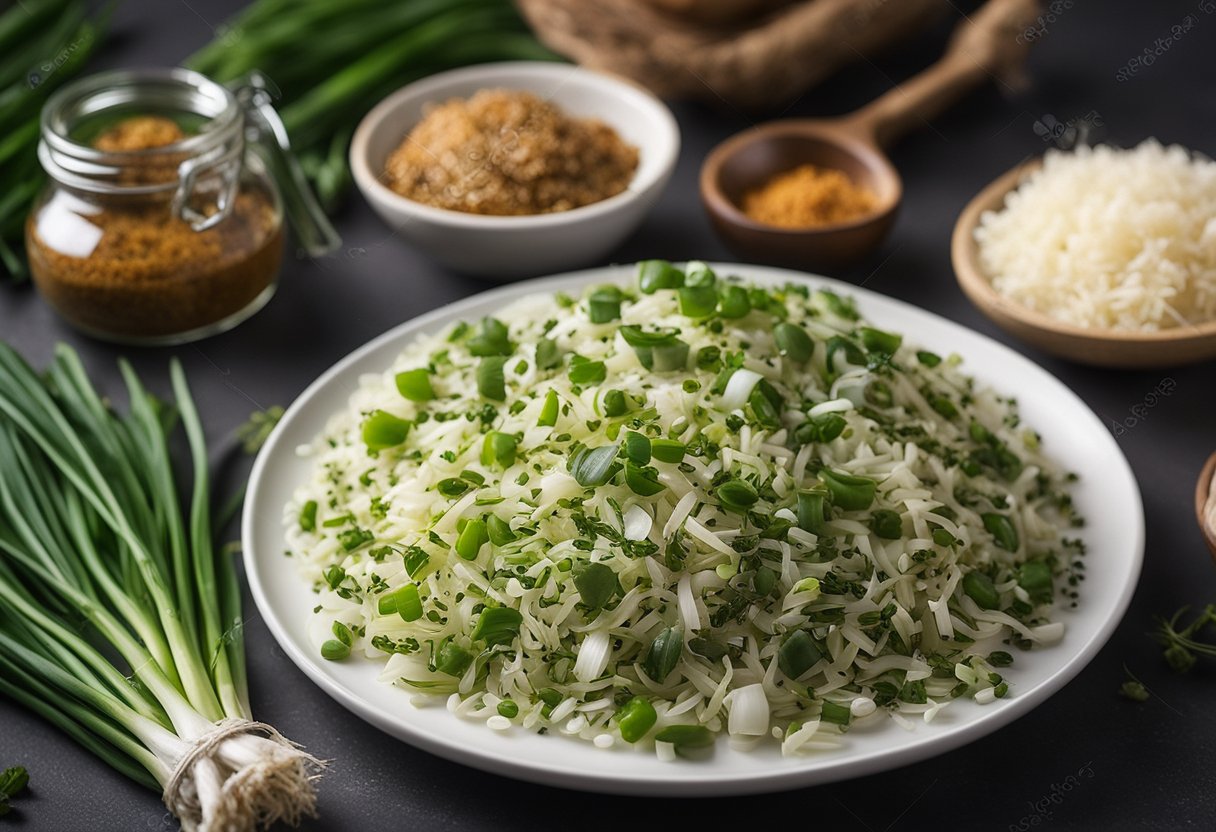
When looking for a substitute for spring onion, there are a few factors to consider that can help you choose the best alternative for your dish.
Here are some things to keep in mind:
Flavor: Spring onions have a mild, sweet onion flavor that is not too overpowering. When choosing a substitute, look for an onion or onion-like vegetable with a similar flavor profile. Shallots, leeks, and scallions (green onions) are all good options.
Texture: Spring onions have a crisp texture that adds a nice crunch to dishes. If texture is important to you, consider using a substitute that has a similar crunch. Scallions and leeks are both good options.
Bulb vs. Leaves: Spring onions are unique in that they have both a bulb and leaves that can be used in cooking. When choosing a substitute, consider whether you need a vegetable with a bulb, leaves, or both.
Scallions are a good substitute if you only need the leaves, while shallots are a good option if you need a bulb.
Cuisines: Different cuisines use different types of onions, so consider the cuisine of the dish you are making when choosing a substitute. For example, shallots are commonly used in French cuisine, while scallions are often used in Asian cuisine.
Allergies: If you or someone you are cooking for has an allergy to onions, you may need to consider a non-allergenic substitute. Chives are a good option in this case, as they have a similar flavor to spring onions but are not in the onion family.
By considering these factors, you can choose a substitute for spring onion that will work well in your dish and complement the other flavors and textures.
Storing Substitutes for Spring Onions
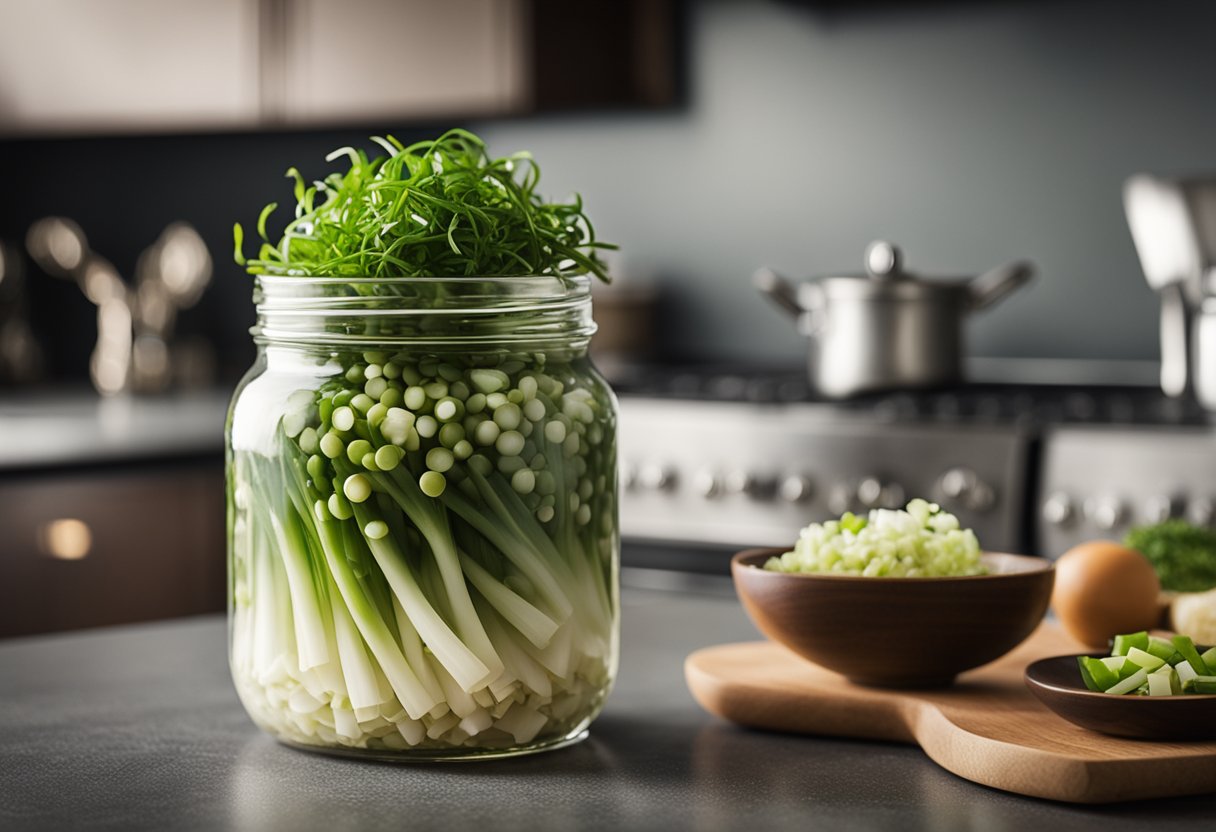
As with most fresh produce, it is important to store substitutes for spring onions properly to ensure they last as long as possible.
Here are some tips on how to store some of the most common substitutes for spring onions:
Green Onions or Scallions
Green onions or scallions can be stored in the fridge for up to one week. Wrap them in a damp paper towel and place them in a plastic bag before storing in the vegetable crisper.
Shallots
Shallots can be stored in a cool, dry place such as a pantry or cupboard for up to one month. Make sure to keep them away from direct sunlight and moisture.
Leeks
Leeks can be stored in the fridge for up to two weeks. Remove any rubber bands or ties and wrap them in a damp paper towel before storing in a plastic bag in the vegetable crisper.
Fresh Chives
Fresh chives can be stored in the fridge for up to one week. Wrap them in a damp paper towel and place them in a plastic bag before storing in the vegetable crisper.
Red Onions
Red onions can be stored in a cool, dry place such as a pantry or cupboard for up to one month. Make sure to keep them away from direct sunlight and moisture.
When storing any of these substitutes for spring onions, it is important to check them regularly for any signs of spoilage such as mold or soft spots. If you notice any signs of spoilage, discard the affected pieces immediately.
It is also worth noting that some substitutes for spring onions, such as shallots and leeks, come in small bulbs with multiple layers. When using these substitutes, make sure to remove any dry or tough outer layers before using.
Conclusion
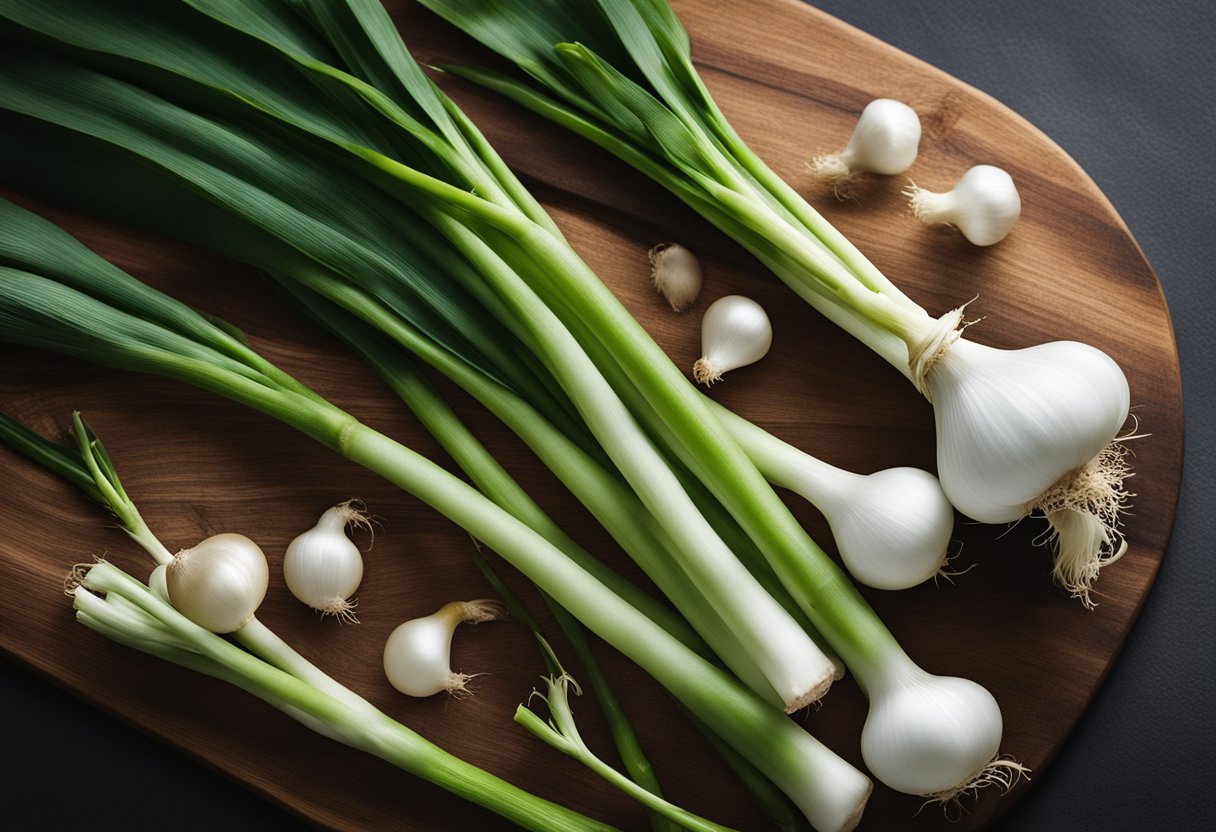
In conclusion, there are several substitutes for spring onions that can be used in cooking. Depending on the recipe and desired flavor, one may choose from the following options:
- Green onions or scallions: These are the best substitute for spring onions as they have a similar taste and appearance. They are also readily available in most markets.
- Leeks: Leeks have a milder and sweeter flavor than other onions and are commonly used in soups and stir-fries.
- Shallots: Shallots have a more pungent flavor than spring onions and are a good substitute for recipes that require a stronger onion flavor.
- Red onions: Red onions can be used as a substitute for spring onions in recipes that require a mild onion flavor. They are easy to find in markets and are commonly used in cooking.
- Chives: Chives have a milder flavor than spring onions and are best used as a garnish or in dishes that require a subtle onion flavor.
- Garlic: Garlic has a strong and pungent flavor and can be used as a substitute for spring onions in recipes that require a bold onion flavor.
It is important to note that the amount of substitute used may vary depending on the recipe and personal preference. Experiment with different substitutes to find the best flavor for your dish.
Frequently Asked Questions
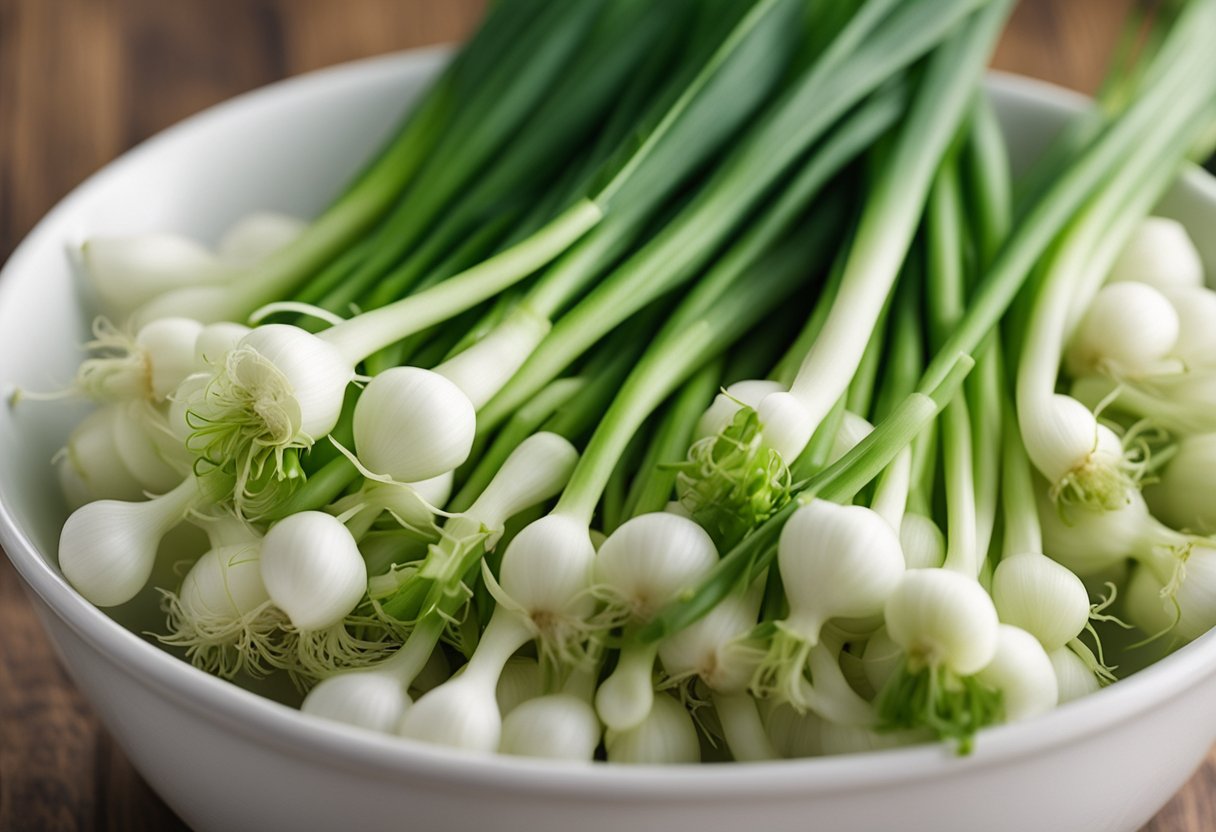
What are some good substitutes for scallions and chives?
Some good substitutes for scallions and chives include shallots, leeks, ramps, red spring onions, onion powder, and chives. These substitutes have similar flavors and can be used in place of scallions and chives in most recipes.
How many spring onions are equivalent to one onion?
Typically, one spring onion is equivalent to about a quarter of a regular onion. So, if a recipe calls for one onion and you only have spring onions, you would need to use about four spring onions to get the same amount.
What is a good substitute for spring onions in recipes?
A good substitute for spring onions in recipes would be shallots or leeks. Both have a similar flavor and can be used in place of spring onions in most recipes.
Can onions be used as a substitute for scallions?
While onions can be used as a substitute for scallions in some recipes, they have a stronger flavor and a different texture. It is best to use shallots or leeks as a substitute for scallions.
What is the American equivalent of spring onion?
The American equivalent of spring onion is green onion or scallion. These terms are used interchangeably in the United States.
What are some alternatives to green onions?
Some alternatives to green onions include chives, shallots, leeks, ramps, and red spring onions. These alternatives have similar flavors and can be used in place of green onions in most recipes.







